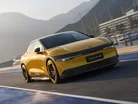Zeekr Boasts Fastest Charging EV Battery in the World

Earlier this month, Zeekr announced a significant advancement in electric vehicle (EV) technology with the introduction of its upgraded lithium iron phosphate (LFP) prismatic batteries.
These new batteries offer 5.5C ultra-fast charging, allowing vehicles to charge from 10% to 80% state of charge (SOC) in just 10-and-a-half minutes, making it the fastest charging EV battery in the world.
This breakthrough aims to address the issue of range anxiety, a common concern among EV users, by providing faster, more reliable charging options.
Zeekr is a global premium electric mobility brand under Geely Holding Group. With R&D centres and design studios in Ningbo, Hangzhou, Gothenburg and Shanghai, Zeekr has delivered more than 300,000 vehicles since October 2021. The company plans to expand into European, Latin American and other Asian markets within five years to meet growing global EV demand.
The enhanced battery management system
The first model to feature the cutting-edge battery will be the 2025 Zeekr 007 sedan, which is set to be delivered to customers at the end of the month.
This model, equipped with the new LFP batteries, achieves a new charging speed record when connected to Zeekr's V3 ultra-fast charging piles. This improvement is a testament to the ongoing efforts of Zeekr’s in-house e-powertrain research and development team, which has have optimised materials and technology to surpass the performance of existing nickel-cobalt-manganese batteries.
The enhanced battery management system (BMS) plays a crucial role in maintaining the vehicle's charging performance. Even in harsh environmental conditions, such as temperatures as low as -10°C, the vehicle can charge from 10% to 80% SOC in just 30 minutes. This ensures that users can rely on swift and stable charging, regardless of external factors.
Zeekr has also made substantial progress in expanding its charging infrastructure. The company has already established more than 500 ultra-fast charging stations across China, featuring more than 2,700 charging piles, all of which support 800V charging.
The company has ambitious plans to continue expanding this network, with a target of 1,000 ultra-fast charging stations by 2024 and more than 10,000 ultra-fast charging piles in operation by 2026.
Driving innovation beyond the battery
In addition to its advancements in battery technology, Zeekr has introduced new driving assistance features including the urban Navigation Zeekr Pilot (NZP) system, which is designed to provide intelligent driving assistance on urban roads, using advanced navigation tools.
The NZP is set to begin deliveries at the end of August, offering users enhanced convenience and safety in city driving scenarios.
It is integrated with Zeekr's AI model, Eva, which acts as an in-car assistant. Eva evolves into a more intuitive driving companion, capable of anticipating situations and providing relevant suggestions to the driver. This feature is designed to enhance the overall in-car experience, making driving more comfortable and less stressful for Zeekr users.
By improving charging speeds, expanding infrastructure and introducing advanced driving assistance systems, Zeekr continues to position itself as a leading player in the global electric mobility market.
These advancements not only enhance the functionality and convenience of Zeekr’s vehicles but also contribute to the broader adoption of electric vehicles by addressing key challenges faced by EV owners.
With these innovations, Zeekr is set to meet the growing demand for electric vehicles and further solidify its reputation as a premium electric mobility technology brand.
This growth is clear, as its maiden financial results established the company as an industry leader.
“117% year-on-year growth marks a new quarterly high and brings us one step closer to our full-year target of delivering 230,000 units,” comments Andy An, CEO at Zeekr, discussing the quarterly results.
The new Zeekr 007 model, a B-class pure electric luxury sedan, will feature the world-class battery. It is the first sedan to use an integrated mega-casting rear-end aluminium body, enhancing torsional stiffness to 43,500 N·m/deg.
Powered by Zeekr’s lithium-ion phosphate (LFP) batteries, the 007 offers a range of 688 km (CLTC) and can charge 500 km in 15 minutes. The long-range version boasts an 870 km range with CATL’s Qilin batteries.
The sedan also features the advanced highway Navigation Zeekr Pilot (NZP) system, built on NVIDIA DRIVE, and the KR AI intelligent cockpit platform. With a starting price of RMB 209,000, deliveries begin on 1st January next year.
*******************
Make sure you check out the latest edition of EV Magazine and also sign up to our global conference series - Sustainability LIVE 2024.
*******************
EV Magazine is a BizClik brand.
- IDTechEx: Prominence Lithium-Iron Phosphate EV BatteriesTechnology
- Comcast & EV Connect Join Forces to Transform EV ChargingCharging & Infrastructure
- Hindalco Launches EV Fleet for Sustainable TransportSustainability
- San Francisco Expands Curbside EV Charging ProgrammeCharging & Infrastructure


